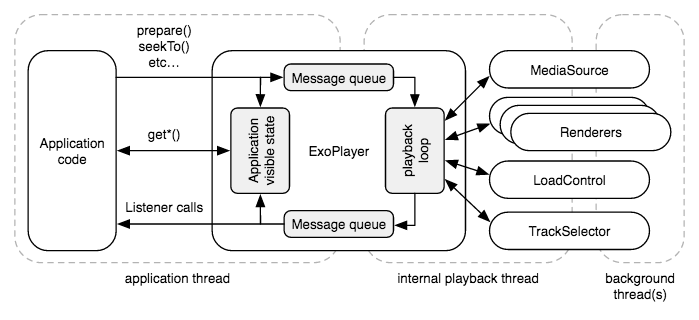Exploring ExoPlayer
ExoPlayer is an extensible, application level media player for Android apps. It’s an alternative to the high level Android MediaPlayer API. MediaPlayer is built on several low level media playing APIs like AudioTrack and MediaDRM. These low level APIs can also be used by developers to build your own media player with it’s own custom behavior. ExoPlayer is built on these low level APIs and it has the additional benefit of being open source. You don’t need to build your own media player, from scratch, to get the behavior you need. You can extend ExoPlayer instead.
ExoPlayer was created and is maintained by Google. Out of the box, it can play a wide range of audio and video formats such as:
- MP3
- MP4
- WAV
- MKV
- MPEG-TS
- Ogg
Remember, ExoPlayer is open source, so it can, with some extension, decode and play any format, as long as you build the capability.
Just a Few ExoPlayer Basics & Components
 Source: ExoPlayer Documentation on GitHub
Source: ExoPlayer Documentation on GitHub
ExoPlayer
The ExoPlayer class is the actual media player. It depends on a few other components for media loading, buffering, decoding, and track selection. When all of the required components are configured, your app will interact with the ExoPlayer class to control the playback of your media. You can register listeners with ExoPlayer to be notified of certain events like buffering or the conclusion of a track.
MediaSource
The MediaSource class is charged with controlling what media will be played and how it will be loaded. The MediaSource class is used directly by the ExoPlayer class. MediaSource enables a ton of different behaviors. For example, you can merge multiple MediaSource classes together to show video, along with captions or you can use multiple MediaSource classes to create playlists where the transitions between those sources are seamless (gapless).
There are several prebuilt MediaSource classes available out of the box in ExoPlayer to support many common use cases like playing normal media files or streaming DASH content from a remote server. Of course, you can implement your own to support your application’s use case.
DataSource
The DataSource class provides samples of data to a MediaSource. These samples of data can originate from a file on the SD card, a resource in the assets directory, and even a remote server. You can use one of the prebuilt DataSource classes or build your own to read data in a way necessary to support your use case. For example, maybe your application will stream media on a company intranet. You can use a custom DataSource to define the rules and protocols that allow this to happen securely.
TrackSelector
The TrackSelector class dictates which track is selected for rendering and playback.
Renderer
The Renderer class decodes media and renders it. An example implementation is the MediaCodecAudioRenderer, which decodes audio data and renders it using several lower level ExoPlayer APIs.
LoadControl
The LoadControl class defines the buffering behavior of a particular MediaSource.
Finally
At this point, I know as much about ExoPlayer 2 as you do. I have some pretty extensive knowledge of ExoPlayer 1.X because I’ve used it on several Android projects that I’ve worked on. This series on ExoPlayer 2 will document my journey of learning about ExoPlayer 2 and upgrading an app to ExoPlayer 2 that is currently using ExoPlayer 1.5.9. I will probably make mistakes, but I hope this series will help a few other developers in their effort to implement ExoPlayer 2 in a real world app.
The app I will be using for demonstrating this upgrade is PremoFM. PremoFM is an open-source podcast player that I started building almost two years ago. The source code for the app is on GitHub (https://github.com/emuneee/premofm). I will be using a branch (https://github.com/emuneee/premofm/tree/exoplayer_2) for all of my ExoPlayer 2 upgrade work. I invite you to follow along. I’ll be back next week to discuss the structure of a typical audio playing app and how ExoPlayer fits in.
Please follow me on Twitter (@emuneee).
Finally, I’m working with a great team at RadioPublic to build an awesome podcast experience for Android and iOS. Hop on the beta today.
Some resources to review in the meantime:
ExoPlayer on GitHub
https://github.com/google/ExoPlayer
ExoPlayer — Developer Guide
https://google.github.io/ExoPlayer/guide.html
ExoPlayer on Medium
https://medium.com/google-exoplayer
Android Developer Backstage 48: ExoPlayer
http://androidbackstage.blogspot.com/2016/05/episode-48-exoplayer.html
🧇